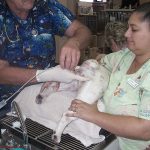Do French Bulldogs Bite A Lot?
Choosing the perfect furry friend for your family is no small feat. And when it comes to French Bulldogs, one question that often pops up is whether they have a tendency to bite a lot. With their adorable squished faces and friendly demeanor, it’s hard to imagine these lovable dogs sinking their teeth into anything. But as with any breed, it’s important to remember that individual dogs can have different behaviors. So, in this blog post, we’re diving deep into the biting behavior of French Bulldogs, separating fact from fiction and shedding light on this often-misunderstood trait.
First things first – let’s clear the air. French Bulldogs are not inherently aggressive or prone to excessive biting. Like any breed, their actions depend on a variety of factors such as genetics, socialization experiences, and training. While some Frenchies may show a penchant for nibbling more often than others, most of them have hearts full of love and gentleness.
Now here’s the scoop – biting incidents in French Bulldogs are pretty rare compared to other breeds. But don’t get too comfortable just yet. It’s essential for owners to be aware of potential triggers that might lead to biting. Things like fear, anxiety, pain, or feeling threatened can push a Frenchie to resort to self-defense through nipping. Ignoring warning signs or neglecting proper training and socialization can also increase the chances of biting behavior rearing its ugly head.
But fret not. There are practical steps you can take to minimize biting tendencies in your French Bulldog companion. Early socialization is key – expose them to other animals and people from an early age so they grow up confident and less anxious. Consistent positive reinforcement training will help set boundaries and teach your Frenchie how to behave appropriately in various situations. And don’t forget to keep their minds and bodies active with plenty of mental and physical stimulation. A happy Frenchie is a well-behaved Frenchie.
In conclusion, while it’s important to acknowledge that individual French Bulldogs may display biting tendencies, painting the entire breed as aggressive would be unfair. With the right training, socialization, and understanding of their unique personalities, French Bulldogs can become loyal, well-mannered, and gentle companions. So arm yourself with knowledge and be a responsible owner – your beloved Frenchie will reward you with endless snuggles
Do French Bulldogs bite a lot
Contents
- 1 Do French Bulldogs bite a lot
- 2 What Makes French Bulldogs Prone to Biting?
- 3 The Role of Fear in French Bulldog Biting Behavior
- 4 Protectiveness as a Cause of Biting in French Bulldogs
- 5 French Bulldog Biting is Not an Inherent Trait
- 6 Training and Socialization are Key to Preventing Biting
- 7 Positive Reinforcement for Teaching Appropriate Behaviors
- 8 Socializing Your French Bulldog to Reduce Fear-Based Aggression
- 9 Conclusion

French Bulldogs are beloved for their friendly and affectionate nature. However, like any dog breed, there is always the potential for biting behavior. In this comprehensive guide, we will explore the factors that can contribute to biting in French Bulldogs and provide tips on how to prevent and address this behavior.
Genetic Predisposition:
While not all French Bulldogs bite, some individuals may inherit aggressive traits from their parents or ancestors. It is important to choose a reputable breeder who prioritizes temperament when selecting breeding pairs. This can help reduce the likelihood of inherited aggression.
Upbringing and Socialization:
Proper training and socialization from an early age are crucial in preventing biting behavior. French Bulldogs that have not been exposed to different people, animals, and environments may exhibit fear-based or defensive aggression. By gradually introducing them to new experiences and positively reinforcing good behavior, you can help your French Bulldog feel more comfortable and less likely to resort to biting.
Medical Conditions and Discomfort:
Certain medical conditions or discomfort can cause a dog to bite. French Bulldogs are prone to allergies, skin irritations, and joint problems. If your dog is experiencing pain or discomfort, it may react aggressively when touched or approached. Regular veterinary check-ups and addressing any health issues promptly can help mitigate this risk.
Recognizing Signs of Aggression:
It is crucial for owners to be aware of the signs of potential aggression in their French Bulldogs. Growling, snapping, showing teeth, stiff body language, and raised hackles are indicators that your dog may be feeling threatened or uncomfortable. Recognizing these signs early on allows you to take appropriate action to prevent bites.
Prevention through Training and Socialization:
Positive reinforcement training methods should be used to teach your French Bulldog appropriate behaviors and establish boundaries. Training sessions should be consistent, frequent, and enjoyable for both you and your dog. Socialization with different people and animals should also be a priority, exposing your French Bulldog to various situations in a controlled and positive manner.
Providing Mental and Physical Stimulation:
Boredom-related aggression can be prevented by providing your French Bulldog with mental and physical stimulation. Engaging in activities like puzzle toys, obedience training, and regular exercise can keep them mentally engaged and decrease the likelihood of biting out of frustration or pent-up energy.
Seeking Professional Help:
If your French Bulldog shows signs of aggression or biting behavior, it is crucial to seek professional help from a qualified dog trainer or behaviorist. They can assess the underlying causes of the behavior and develop a tailored training plan to address the issue effectively.
What Makes French Bulldogs Prone to Biting?
French Bulldogs, those adorable little clowns of the dog world, have a reputation for being prone to biting. But why is that? Let’s dive into the factors that contribute to this behavior and explore how we can prevent it.
Genetic Predisposition:

French Bulldogs have a history rooted in bull-baiting. This sport involved dogs biting and holding onto bulls. While we’ve come a long way from those brutal days, the genetic imprint remains. French Bulldogs are more inclined to use their mouths aggressively due to their breeding history.
Prey Drive:
French Bulldogs have a strong prey drive, which means they may be more likely to bite when they spot small animals or moving objects. It’s like their inner hunter takes over. Managing this instinct can be a challenge, but it’s crucial to prevent biting incidents.
Fear and Anxiety:
Just like any other dog, French Bulldogs can experience fear or anxiety in certain situations. When they feel threatened or overwhelmed, biting becomes a defensive response. Identifying and addressing the underlying causes of fear or anxiety is key to preventing biting episodes.
Lack of Socialization and Training:
Proper socialization and training are essential for all dogs, including French Bulldogs. If they haven’t been exposed to different environments, people, and animals during their critical socialization period, fear or aggression may arise later in life. Additionally, if they haven’t received proper training and boundaries, they may resort to biting as a way of communication or asserting dominance.
Health Issues:
French Bulldogs are prone to health problems like allergies and skin irritations. These issues can cause discomfort and make them more irritable or reactive, leading to potential biting incidents. Taking care of their health through regular vet check-ups and appropriate medical care can reduce the likelihood of biting behavior.
The Role of Fear in French Bulldog Biting Behavior
Today, we dive deep into the intriguing world of French Bulldog biting behavior. While these delightful pooches may look cute and cuddly, it’s essential to understand the role fear plays in their occasional nips and bites. So, grab a cup of café au lait, and let’s unravel this mystery together.
Unmasking the Fear:
- Fear as a Trigger: Just like us humans, French Bulldogs can feel scared or threatened. When faced with unfamiliar or intimidating situations, they may resort to biting as a way to protect themselves or communicate their unease.
- Identifying Triggers: Loud noises, unfamiliar faces or animals, certain environments, or past traumatic experiences can trigger fear in our furry friends. Knowing these triggers can help prevent biting incidents and create a harmonious environment.
- Early Socialization and Training: Picture this – your Frenchie strutting confidently through life, tail held high. Proper socialization and training from a young age play a significant role in reducing fear-related biting behavior. Exposing them to diverse experiences and positive encounters builds their confidence and reduces anxiety.
- Genetic Factors and Medical Conditions: Sometimes, fear-based aggression in French Bulldogs can be influenced by genetic factors or underlying medical conditions. Consulting with professionals like veterinarians or certified dog trainers can help identify any hidden issues contributing to biting behavior.
Creating a Safe Haven:
- Stability is Key: Providing a safe and secure environment is vital for French Bulldogs to feel protected and reduce potential triggers for fear. Implement management techniques like baby gates, crate training, or using leashes in certain situations to create stability.
- Seek Professional Help: If your Frenchie displays fearful behavior or exhibits aggression through biting, don’t hesitate to seek guidance from certified dog behaviorists or experienced trainers specializing in fear-related issues. They can assess the situation and provide tailored solutions.
- Positive Reinforcement: Remember, punishment is a no-go. Instead, focus on positive reinforcement techniques to encourage desired behaviors and build trust between you and your delightful Frenchie.
Protectiveness as a Cause of Biting in French Bulldogs
French Bulldogs are notorious for their loyalty and protective nature. While this quality is endearing, it can also lead to biting incidents if not properly addressed. In this section, we will explore how protectiveness can manifest as biting behavior in French Bulldogs and discuss steps that can be taken to address and prevent these incidents.
Understanding the Protective Instinct

French Bulldogs have a deep-rooted instinct to protect their owners and territory. This stems from their history as companion dogs, bred to be loyal and devoted to their human counterparts. They form strong bonds with their families and will go to great lengths to keep them safe.
Identifying Triggers
It is important for owners to recognize the triggers that may cause their French Bulldog to become protective and potentially resort to biting. Common triggers include strangers approaching the owner, perceived threats to the home or family members, or even unfamiliar situations that make the dog feel uneasy.
Early Socialization as Prevention
Early socialization is key in shaping a French Bulldog’s behavior and reducing the likelihood of biting incidents. Exposing them to different people, animals, and environments from a young age helps them learn how to appropriately respond without resorting to aggression. This can be done through puppy classes, regular outings, and controlled interactions with other dogs and people.
Training Techniques for Addressing Protectiveness
Positive reinforcement training methods are highly effective in teaching French Bulldogs appropriate behavior and reducing tendencies towards biting. Rewarding good behavior and redirecting unwanted behavior can help create a positive association in their minds. Consistency, patience, and clear communication are essential when training a French Bulldog to be less protective.
Seeking Professional Help
If protectiveness and biting behavior persist despite consistent training efforts, seeking the assistance of a professional dog trainer or behaviorist is recommended. They can provide personalized guidance and additional strategies to address the specific needs of your French Bulldog.
French Bulldog Biting is Not an Inherent Trait
Contrary to popular belief, French Bulldog biting is not an inherent trait of the breed. While it is true that French Bulldogs can sometimes exhibit aggressive behavior, it is important to understand that this behavior is not exclusive to the breed and can be influenced by various factors such as genetics, upbringing, and environment.
Proper socialization plays a crucial role in preventing biting behavior in French Bulldogs. Introducing them to different people, animals, and environments from a young age can help them feel more comfortable and confident in various situations. This can significantly reduce the likelihood of fear or anxiety-based biting.
Training and positive reinforcement techniques are essential in teaching a French Bulldog appropriate behavior and preventing biting incidents. By establishing yourself as the pack leader and setting clear boundaries, you can help your French Bulldog understand what behavior is acceptable. Consistency and firmness in training can go a long way in preventing unwanted biting behaviors.

It is also important to note that French Bulldogs should never be encouraged or allowed to use their mouths during play or interaction with humans. Teaching them bite inhibition from a young age is crucial in preventing accidental bites. It can be achieved by redirecting their mouthing behavior onto appropriate chew toys and rewarding them for gentle play.
If your French Bulldog exhibits biting or aggressive behavior, it is important to seek professional help. Consulting with a professional dog trainer or behaviorist who specializes in working with French Bulldogs can provide valuable guidance on how to address the issue effectively.
It is worth mentioning that not all French Bulldogs will exhibit biting behavior. With proper training, socialization, and a nurturing environment, many French Bulldogs can grow up to be well-behaved and non-aggressive dogs.
Training and Socialization are Key to Preventing Biting
French Bulldogs are lovable and affectionate companions, but like any other dog breed, they have the potential to bite. However, with proper training and socialization, biting incidents can be prevented. In this article, we will explore how training and socialization are crucial in raising a well-behaved and non-aggressive French Bulldog.
Start Early with Consistent Training:
Training should begin as soon as you bring your French Bulldog puppy home. Consistency, positive reinforcement, and patience are essential elements for successful training. Teaching basic obedience commands such as “sit,” “stay,” and “leave it” helps establish boundaries and teaches appropriate behavior. Remember to use treats, praise, and rewards to reinforce positive behavior.
The Importance of Socialization:
Socialization is a vital aspect of preventing biting behavior in French Bulldogs. Expose your puppy to different people of all ages, other dogs, and various environments from a young age. This helps them become well-rounded and less likely to display aggression. Regular exposure to new experiences will boost their confidence and reduce fear-based reactions.
Ongoing Socialization:
Socialization should be an ongoing process throughout your French Bulldog’s life. Reinforce positive behaviors by exposing them to new situations regularly. Take them for walks in different neighborhoods, visit dog parks, or schedule playdates with other friendly dogs. This continuous exposure helps prevent potential aggression and ensures they feel comfortable in various settings.
Enroll in Puppy Classes or Obedience Training:
Enrolling your French Bulldog in puppy classes or obedience training courses provides structured learning environments and guidance from professional trainers. These classes not only teach basic commands but also provide opportunities for your dog to interact with other dogs and people in a controlled setting. This interaction helps develop their social skills and reduces the likelihood of biting incidents.
Proper Handling and Establishing Boundaries:
It is essential to learn how to handle your French Bulldog properly. Avoid rough play or encouraging aggressive behaviors that may inadvertently lead to biting. Establish clear rules and boundaries within your household to prevent any confusion or power struggles that might trigger biting behavior.
Seek Professional Help if Needed:
If your French Bulldog exhibits signs of aggression or biting behavior, it is crucial to seek professional help from a certified dog trainer or behaviorist. They can assess the situation and provide guidance tailored to your dog’s specific needs. These professionals have the expertise to address and correct any behavioral issues effectively.
Preventing biting behavior in French Bulldogs requires responsible ownership, consistent training, and proper socialization. Start training early, reinforce positive behaviors, and expose your dog to various experiences throughout their life. Seek professional help if needed, and remember that with patience and dedication, you can raise a well-behaved and non-aggressive French Bulldog companion.
Positive Reinforcement for Teaching Appropriate Behaviors
French Bulldogs are known for their charming personalities and lovable nature. However, like any dog, they may exhibit unwanted behaviors such as biting. In this blog post, we will explore the effectiveness of positive reinforcement in teaching appropriate behaviors to French Bulldogs, with a specific focus on addressing biting behavior.
Understanding Positive Reinforcement:
Positive reinforcement involves rewarding desired behaviors to encourage their repetition. It is crucial to provide immediate rewards such as treats, praise, or playtime when your French Bulldog displays appropriate behavior.
Consistency is Key:
Consistency is paramount in training your French Bulldog. By consistently rewarding good behavior and ignoring or redirecting unwanted behavior, you reinforce the idea that good behavior leads to positive outcomes.
Addressing Biting Behavior:
To address biting behavior, it is important to identify the underlying cause. Is your French Bulldog biting out of fear, anxiety, or frustration? Understanding the root cause will help you tailor your approach accordingly.
Training Alternative Behaviors:
Once the cause of biting is identified, focus on training your French Bulldog to replace biting with more appropriate behaviors. For instance, if your dog tends to bite when excited or seeking attention, teach them alternative ways to express their needs, such as sitting or offering a paw. Reward them every time they choose these alternative behaviors instead of biting.
Redirection Technique:
Redirection is another effective technique for addressing biting behavior. If your French Bulldog starts to bite during playtime or interaction, redirect their attention to a chew toy or engage them in a different activity that is incompatible with biting. This helps them understand that biting is not acceptable while providing an alternative outlet for their energy.
The Power of Socialization and Training:
Positive reinforcement works best when combined with proper socialization and training from an early age. Expose your French Bulldog to different people, animals, and environments in a positive and controlled manner. This helps them develop good manners and reduces the likelihood of biting.
Socializing Your French Bulldog to Reduce Fear-Based Aggression
French Bulldogs are known for their charming personalities, but fear-based aggression can sometimes be a challenge for these lovable pups. However, with proper socialization from a young age, you can help reduce fear-based aggression in your French Bulldog and foster a confident and well-behaved companion.
In this article, we will explore the importance of socialization, provide practical tips, and share personal experiences to guide you on this journey.
Starting Early: The Critical Period of Socialization
The early weeks of a French Bulldog’s life are crucial for socialization. Ideally, start between 3 and 14 weeks when they are more receptive to new experiences. During this period, their brains are like sponges, soaking up information about the world around them. Introduce your Frenchie to various people, animals, and environments to help them become comfortable and confident.
Gradual Exposure: Controlled and Positive Experiences
Gradually expose your French Bulldog to different stimuli in a controlled and positive manner. This could include loud noises, crowded places, unfamiliar objects, or even car rides. By exposing them gradually and ensuring positive associations through treats and praise, you can help them build confidence in unfamiliar situations.
Structured Socialization: Puppy Classes and Obedience Training
Enrolling your French Bulldog in puppy classes or obedience training not only helps with basic commands but also enhances their social skills. These structured environments provide opportunities for controlled interactions with other dogs and humans under the guidance of professional trainers.
Maintenance and Monitoring:
Socialization is an ongoing process that should continue throughout your Frenchie’s life. Regularly expose them to new experiences to maintain their social skills. However, it is crucial to monitor their body language during socialization sessions. If they display signs of fear or discomfort like growling or hiding, it’s important to intervene and provide support or remove them from the situation.
Seeking Professional Help:
Despite your best efforts, some French Bulldogs may still exhibit fear-based aggression. If this behavior persists, it is essential to seek help from a qualified dog trainer or behaviorist who specializes in aggression. They can assess the situation, provide tailored guidance, and develop a behavior modification plan.
EO1ndEC6MvM” >
Conclusion
French Bulldogs are known for their playful and affectionate nature. However, it is important to note that like any other dog breed, French Bulldogs have the potential to bite. While they may not be as prone to biting as some other breeds, it is still crucial to understand their behavior and take necessary precautions.
It is essential to remember that aggression in dogs can stem from various factors such as fear, territorial instincts, or even pain. Therefore, it is vital to socialize your French Bulldog from a young age and expose them to different environments, people, and animals. This will help them develop positive associations and reduce the likelihood of aggressive behaviors.
Additionally, proper training and consistent reinforcement of good behavior are key in preventing biting incidents. Teaching your French Bulldog basic commands like “sit,” “stay,” and “leave it” can go a long way in establishing boundaries and preventing potential conflicts.
Furthermore, providing your French Bulldog with plenty of mental and physical stimulation can help alleviate any pent-up energy or frustration that may lead to biting tendencies. Regular exercise, interactive toys, and engaging activities will keep them occupied and content.
In conclusion, while French Bulldogs may not bite excessively compared to some other breeds, it is crucial to understand their individual personalities and provide them with the necessary training and socialization.




